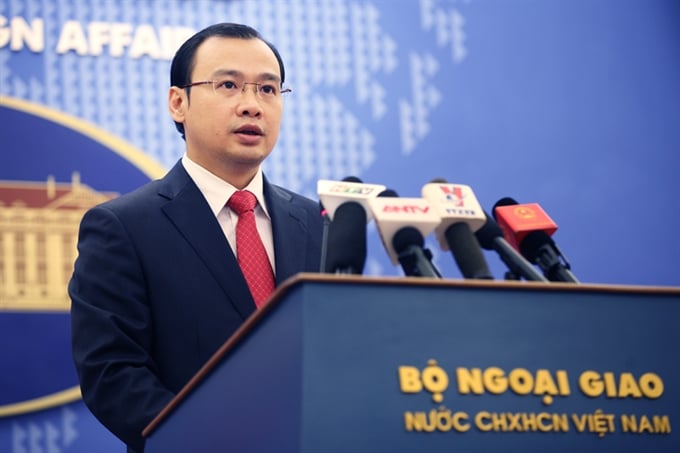
Foreign Ministry’s Spokesman Lê Hải Bình. (Vietnam Breaking News)
The international tribunal’s ruling in The Hague on July 12 was a historic decision which has profound implications for all of the littoral states of the South China Sea. The court’s ruling, which found no justification for China’s so-called “nine-dash line”, also ruled that none of the Spratlys are legally islands—capable of sustaining a stable human community or independent economic life. As such, they are entitled only to territorial seas of up to 12 nautical miles, and not exclusive economic zones (EEZs) which can extend for 200 nautical miles. Now that an arbitral court in The Hague has ruled in favor of Manila over Beijing’s claims to the South China Sea, will Hanoi be next?
Paul Reicher, partner at Foley Hoag in Washington and lead counsel for Manila in its arbitration case, believes the ruling has implications in particular for Indonesia, Malaysia and Vietnam. Interestingly, Reicher has been accused by some Chinese of being the puppet of Washington, despite having helped Nicaragua win a similar case against the U.S. back in the 1980s.
An article in Forbes magazine recently predicted Vietnam will be the next to file a similar arbitration case against China, to affirm the limits of their EEZ. As justification for a filing, the author cites a series of provocative Chinese actions against Vietnam, including the cutting of seismic cables used by Vietnam to explore for oil and gas in its own EEZ in 2012.
However, others analysts, including Joshua Kurlantzick, a senior fellow for Southeast Asia at the Council on Foreign Relations (CFR), believe Vietnam needs to keep its Communist brother China economically and politically close – so Hanoi will not follow the Philippines precedent. Indeed, Vietnam’s initial reaction to the verdict was carefully crafted, given its geographical proximity to and economic dependence on China.
Answering questions from journalists on July 12, Spokesperson of the Ministry of Foreign Affairs of Viet Nam, Le Hai Binh, stated, “Viet Nam strongly supports the settlement of disputes in the East Sea by peaceful means, including legal and diplomatic processes, refraining from the use or threat of use of force in accordance with international law, including the 1982 United Nations Convention on the Law of the Sea, maintenance of regional peace and stability, security, safety and freedoms of navigation and over-flight in the East Sea, and respect for the rule of law in the oceans and seas.” Hanoi had earlier sought legal advice from Manila during the mid-2014 visit of Vietnamese Prime Minister Nguyen Tan Dung, after China had moved its giant offshore oil rig into Vietnam’s EEZ in May 2014.
How Hanoi reacts to the July 12 ruling will largely depend on the actions of Beijing. Should China continue to allow its coast guard to harass and threaten Vietnamese fishermen, or escalate the conflict in other ways, Hanoi will feel the heat from its nationalistic citizenry, and Hanoi will not want the long-standing and significant anti-Chinese sentiment in Vietnam to get out of control and threaten civil disorder—as it did in May 2014. Right now, most Vietnamese are unwilling to take to the street, as the few who did were promptly rounded up.
What is likely is that Hanoi will use the verdict out of The Hague as a bargaining chip—threatening to take Beijing to court should Chinese actions turn aggressive again. Last Tuesday’s statement from Vietnam’s deputy foreign minister, Le Hoai Trung, at ASEAN’s regional security meeting in Laos said it best:
“Our consistent policy is to settle disputes through peaceful means in accordance with national laws and United Nations (conventions and laws), and we attach quite (a lot of) importance to bilateral negotiations.”
“For us, all means of peaceful settlement are important. All means. So you can count (international arbitration) but we attach importance to bilateral negotiations.” “The important factor is you need to have the goodwill, and you need to base your claims on international law, the relevant international law.”
In the wake of the verdict against Beijing, each of the littoral states will attempt to use the ruling and the moral high ground associated with it to bargain with Beijing. Although all of the littoral states of the South China Sea will now be bargaining from a stronger position, will Beijing climb down from their intractable position and negotiate?